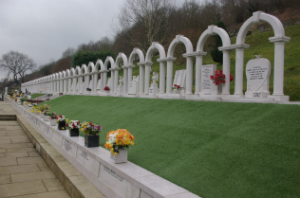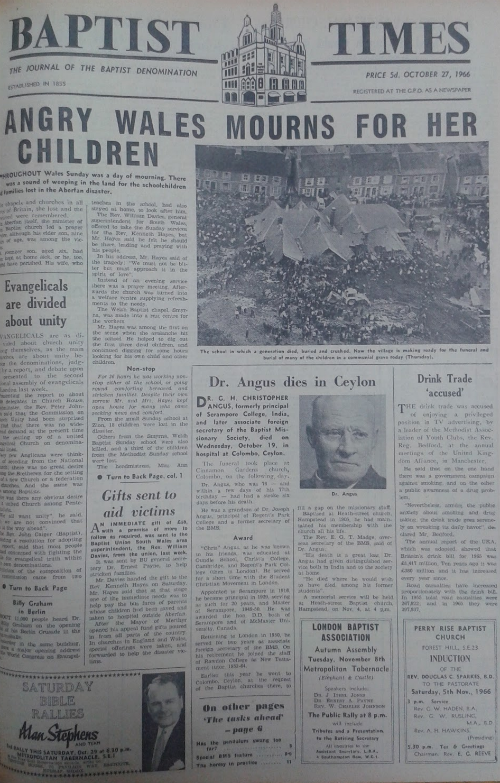Remembering the Aberfan disaster
Baptists are among many to be participating in events to commemorate the 50th anniversary of the Aberfan disaster
 On 21 October 1966 a colliery spoil tip in the Welsh village near Merthyr Tydfil collapsed and unleashed a torrent of slurry down the mountainside. The torrent engulfed a number of houses and Pant-glas Junior School, killing 116 children and 28 adults.
On 21 October 1966 a colliery spoil tip in the Welsh village near Merthyr Tydfil collapsed and unleashed a torrent of slurry down the mountainside. The torrent engulfed a number of houses and Pant-glas Junior School, killing 116 children and 28 adults.
The East Glamorgan Baptist Association marked the anniversary of the disaster with a special service on Wednesday (19 October) that included children from Welsh and English speaking local schools.
Speaking at the event the Revd Simeon Baker, Director of Mission for the Baptist Union of Wales, took an old miners lamp to illustrate the importance of the light that shines in the darkness.
‘Even in such a tragic and sad event we remember the One who journeys with us even through the valley of the shadow of death and shines His light in the darkest place,’ he said.
The service is one of a number of important events in South Wales to mark the mining disaster that affected so many communities in the South Wales valleys.
Professor Paul Ballard – a Baptist minister, and Professor Emeritus at Cardiff University, where he taught practical theology – gave a lecture in Cardiff on Friday night (21 October) about his experiences as a young Baptist pastor in Aberfan.
In 1968 Prof Ballard became involved in the work of Ty Toronto, the churches’ community work project in Aberfan. This was followed up by a wider programme, The Valleys Call, from 1974-5.
‘The village was still reeling when I arrived in 1968,’ he said. ‘Stunned. But there was a determination, especially around the removal of the tips.’
The lecture was entitled Aberfan Fifty Years on – a Practical theological reflection. It covered areas such as pastoral care, community recovery and the nature of the disaster itself (including a theological note about the place of humanity in creation).
The final section featured observations about the participation of churches in the events. Prof Ballard spoke about how Christians were found in the thick of the challenge; but did not relate it to their faith.
‘They just helped, they didn’t think about it,’ he said. ‘They just knew they had to do it. But they didn’t particularly relate it to their faith.’
He also said that while the churches worked closely in the aftermath, there was very little change ecumenically. ‘People worked together, but there was no ecumenical coming together – people just reverted to normal.’
 The Baptist Times report on 27 October 1966 carried the headline Angry Wales Mourns For Her Children.
The Baptist Times report on 27 October 1966 carried the headline Angry Wales Mourns For Her Children.
It told how the eldest son of the Revd Kenneth Hayes, minister of Zion Baptist Chapel in Aberfan, was among the dead – and how the minister had responded:
For 36 hours he was working non-stop either at the school, or going round comforting bereaved and stricken families. Despite their own sorrow, Mr and Mrs Hayes kept open house for many who came seeking news and comfort.
Eighteen children from the Sunday School at Zion were lost in the disaster, the newspaper reported. It also told of the growing anger towards the coal board, which people were blaming for the tragedy. 'Some very bitter things are being said about warnings having been ignored,' said the Revd GH Williams of Merthyr Tydfil. But it was chiefly among the church goers that bitterness was being expressed, according to Mr Williams. 'The church people have taken it in a wonderful spirit, without bitterness.'
On the Sunday following the disaster, according to his obituary in The Independent in 1998, (the day after his son’s body had been found), Kenneth Hayes preached in his chapel to an audience of journalists, 'many of them in tears throughout.'
In the awful months that followed, he and his wife kept the community afloat. They ran an appeal for toys for the surviving children of Aberfan that generated a huge and emotional response, as did the main disaster appeal. Kenneth Hayes’ manse became the office in which the local solicitor took the statements that would confirm the Coal Board’s culpability for the disaster.
Related: Aberfan: The Quiet Heroism of the Wounded Healer
Picture: Aberfan Cemetery/ Stephen McKay / Wikimedia Commons / Creative Commons
Baptist Times, 21/10/2016